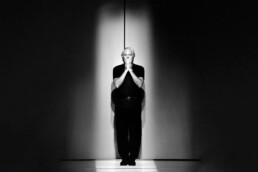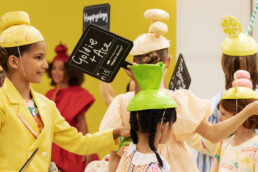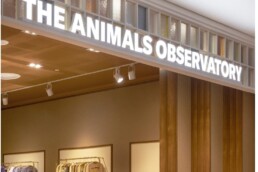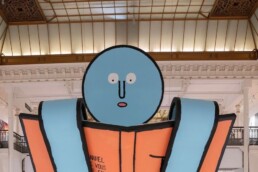We are obsessed with our kids. Society’s move from ancestor worship to descendant worship has made us uninterested in culture, more primitive in our outlook, worse citizens, and ultimately… boring. That seems the Parenting Paradigm as presented by the English media. Readers of Pirouette know that it need not be this way.
The smarter pages of the British press seem to subscribe to a view of parenting that would have us believe it is inherently uncool, and maybe even unworthy. This Parenting Paradigm implies that family life is necessarily exasperating, duff, or a less adventurous and decidedly less aesthetic way to be, than pursuing a childless existence.
Being a parent is somehow more self-centered, more inward looking than the alternative. The intrepid Rory Stewart MP penned a piece for the The Economist’s Intelligent Life suggesting that children are the “Opium of the people” in our day and age.
The Weekend FT las month carried an article by Janan Ghanesh going one step further, suggesting that it’s better going it alone. Being childless may be better than the reverse. There are echoes of conversations with friends and acquaintances here about the trials and tribulations of parenting. And who doesn’t recognise in these writings the very vocal, local obsession of parents we all know with their own children. Harried and haggard, every day is an obstacle course of plastic baby junk for the young parent. Juggernaut strollers become a public menace. Later it’s both parents and children contending with the obstacle course of primary, secondary and higher education. All they ever talk about is their kids. These are familiar caricatures, but the Parenting Paradigm here goes beyond the aesthetic or educational.

Too uncool for school
Child-rearing is an all-encompassing endeavour, and one that necessarily crowds out everything else. “It is a dismal thing, life, if its highest meaning is its own perpetuation. The distinguishing thing about being human is that we have other reasons to live than the bleak circularity of continuing our species. We aim for more than the Darwinian minimum. Art, travel, cuisine, sport, sex that signifies nothing but its own pleasure, conversation with friends that works towards no practical purpose.”

Readers of Pirouette are hardly those who forsake art, travel, cuisine, sport, or the pleasures of meandering conversations with friends. Do parents necessarily abstain from non-procreative coupling, or somehow derive less pleasure from it? That’s clearly nonsense, but it is certainly a cliche one can recognise in so much media imagery.
The defeatist stereotype is that the joys of paternal love are the compensation for all the sleepless nights, the lack of spontaneity, the compromises and sacrifices. The sacrifices themselves, however, are inevitable. And that’s the recurring myth that so many intelligent adults and young parents, judging from their actions, seem to accept at face value.

Parenting, like many difficult things worth doing, requires application. Like most myths, there’s a foundation of fact in this mindset. It’s no walk in the park. More like a marathon. All readers who have endured the challenges especially of the early, intensive phase of parenting, know all too well the challenges of balancing work, life, love. Yet all of these things – art, travel, cuisine, sport, even romance – are more than possible. They are integral to the act of parenting. “We live for the ludic,” suggests the FT. “It is easier to partake in most of these things without the constraints of family.”
Are they more difficult? If you choose to accept the Parenting Paradigm, they would seem to be well nigh impossible. Is parenting necessarily obsessive, crowding out everything else? Are all parents destined to become ‘Opium’ addicts? “As every one of my friends who complains about kids behaves exactly the same as everybody else as soon as they have kids, I presume I’m going to be the same,” says Rory Stewart with a grin. You might call this view of life Parenting by Default. There are better ways.
Family, Society, Civilisation
These are not simply aesthetic choices. “Children’s Fashion” often draws bemused reactions from people, and sometimes derision as something hopelessly superficial. Of course the choices we make about how we clothe ourselves informs and says a lot about our values: an eye for design, craftsmanship, quality, durability. How and where we travel, what we read, what we eat, what we choose to watch even more so.
These are all choices that go well beyond appearances or aesthetics. Art, travel, cuisine, sport – all of these are integral to cosmopolitan family living, not alternative to it. Janan’s rugged individualist, the childless opposite of the Paradigm Parent, presents an arbitrary dualism that is perhaps a feature of an Anglo-Saxon, reductivist mindset.

“There is no such thing as society”, Maggie Thatcher famously said. Judging from writing like this, you are either a childless, free-wheeling individual, or an unswerving champion of the nuclear family unit. “Society is increasingly intolerant of non-parents”, citing tax breaks and the importance of a having a family aura to get elected as a politician. Even Jamie Dimon, CEO of JPMorgan, a master of the universe if ever there was one, circulates Christmas cards of his family, a marker for “balance” designed to show he’s primus inter pares among CEOs. So family becomes a political marker, a status or style statement.
Stewart’s provocative case for a less child-centred society is that it may actually allow for more, not less, commitment to the public realm. “People who might once have been public figures, deeply invested in their work, are instead busy serving their children,” he writes in Intelligent Life. “I’d prefer our opium to be the struggle to create a living civilisation.”
As if these two things were mutually exclusive! The assumption is that our familial duty supersedes our duty to anything or anyone else. Blood may be thicker than water, but family can be the first locus of responsible citizenship. Why do some of us worry about the despoilation of the earth if not for future generations – and not merely of our own progeny. Are those who dote on their own children any less successful as painters, politicians, financiers? Are they any less committed to public causes or the advancement of civilisation?
Retreat, in order to venture forth
You’d be hard pressed to find such attitudes in our new home, Portugal. They seem to be less prevalent in countries and communities where older generations and younger generations mingle more freely. Janan suggests that the family unit may even be a throwback to pre-liberal times, to the less developed social norms of the tribe. It’s notable that in Mediterranean societies we have come through a severe economic downturn at high cost but without the complete disintegration of the social fabric. How many of Spain and Italy’s unemployed young people have found their safety net not in the state but among parents, grandparents and the extended family?

Family Life vs Child-Free life seems like the wrong dichotomy. And yet, we’re all familiar with the obsessiveness these writers refer to. Why do parents seem to make themselves such an easy target for caricature? We all know the type, those obsessive minders of their immediate kin, to the exclusion of everything else. Too many of us, perhaps, are consumed with anxiety.
Every new generation has the challenges of its age to contend with. Status anxiety may just be the defining angst of our age. How will our children fare in the fiercely competitive global marketplace? Will the curricula vitae that may have served us well in earlier life server our children equally well? Many parents rely on the ready formulas – the right schools, associations, technology – as anyone who has taken part in the race for school places in New York or London will attest.
Not that these are unimportant tools. They may not be an adequate substitute however for our own example, the wisdom of generations, a respect for those who came before, and will be here in future.
“The best case for parenthood is the most modest – retreat.”, writes Janan. Family provides sanctuary, and that is why individuals seek it out. It seems strange that we should need to make a case for parenthood at all. Are we similarly to make a case for living child-free? Who are we petitioning? The overwrought logic of “success” in the global marketplace indeed pushes many parents to project their anxiety. It is the anxiety, not the parenting, that requires the pain-killing opium hit.
Many parents may indeed be seeking “someone to care for us when we get old”, as Janan suggests. Each of us needs to be self-sufficient, or have someone to lean on for example in developed societies where relying on public pensions in one’s twilight years is clearly folly. However, to see kids as an insurance policy against growing old is way too instrumental.

Family in these pages is a form of self-defense for those who are insufficiently intrepid or who lack civic engagement. Parenting is regressive: “the strongest family units exist in the least developed societies”. Whatever we might think of that assertion, perhaps development is not such a blessing considering the costs. A “less developed society” may not be such a bad thing.
The Parenting Paradigm seems to be a particular obsession in the global financial capitals of cities like New York, London, Hong Kong. With mercantile capitalism running rampant, there is a rationale for reverting to localism, not just to the immediate family but to knowing where your food comes from, to being able to more readily negotiate an increasingly complex and commercially driven world.
Slow Society – what’s your opiate of choice?
These writers assume that everyone wants to subsume themselves into “something greater than ourselves”. Being a parent does not however necessarily mean subsuming yourself. That’s a choice. The Parental Paradigm can dictate that if you allow it to. However, parenting can also be a vehicle for self-expression. We decide whether to abide by the conventions. Many do not – think of all the authors and readers of these pages with their home schooling, their independent thinking, slow food, slow life. How do we impart to our children the virtues of self-sufficiency, adaptability, resourcefulness? The best marker of “success” may not be our children’s income post-graduation, but their ability to laugh and live contentedly in the ancestral continuum that it is to be human.
The best case for parenting is not retreat, but venturing forth. Though that may be your choice, living adventurously does not require living single, or as a free-wheeling, childless couple. Every day can be a celebration of life’s possibilities. That’s true whatever your marital or familial status.

“It is a kind of enhanced reality”, writes Janan. “Going childfree is not a frigid denial of life, it is the ultimate immersion in life.” Readers of Pirouette would doubtless say the same thing of their ultimate immersion in life as parents. The dichotomy of this argument has echoes of the sterile and shrill debate between believers and atheists, each claiming for their side of the argument an enhanced or a “more real” reality, a deeper appreciation of life.
Perhaps the Opium of the Masses is our children. However, they are just one marvelous intoxicant among many in life. I’m all for spending less time begrudging each others’ choices and more time simply celebrating life in all its variety.

Romas Viesulas
I divide my time between home in Portugal – taking road trips to Latin America in search of investment opportunities – and London, where I often present the current affairs programme on Monocle 24 Radio. For Pirouette, I'll take my inspiration from The Swiss Family Robinson. Life with kids is certainly an adventure. It can seem easy to feel shipwrecked however on the high seas of a rapidly changing, ever more globalised world. How can we ensure our children have the tools they need to survive, even thrive?
Subscribe to our Pirouette Newsletter
For news, updates and insights into the business of kids fashion & lifestyle
You might also like
September 4, 2025
The Legendary Giorgio Armani dies
Italian fashion designer Giorgio Armani has died at the age of 91 on Thursday 4 September, 2025. With infinite sorrow, the Armani Group announces the passing of its creator, founder, and tireless…
July 7, 2025
‘A Zoo In My Wall’ headpieces at the Pirouette ‘Mama’s shopping list runway show
Who made the super cute headpieces from our runway show at Pitti Bimbo 101 : A Zoo in my Wall Marcia Barbosa studied graphic design at college & really loves to create with her hands. She…
October 24, 2024
A Day in the Life… Margaux Giudicelli, Loumio
A day in the life of a kids' swimwear brand owner. Looking for new sustainable swimwear to offer your customers. Well check out eco-friendly, stylish, and protective children’s swimwear for a…
October 21, 2024
Shrimps x BINIBAMBA
Pirouette loves a good collaboration.Wrap your little ones up this holiday season with the nostalgia-tinged tones of the Shrimps x BINIBAMBA collection. Capture the cosiness of Christmas with…
August 23, 2024
Another new store opening for The Animals Observatory in South Korea.
A new store opening for The Animals Observatory in South Korea at Daejeon Shinsegae Art & Science:1 Expo -Ro, Yuseong-Gu Daejeon taking the number of store mon-brand stores to 4 in the country.…
February 29, 2024
Jean Jullien’s ‘Paper People’ at Le Bon Marche Rive Gauche, Paris
If you're in Paris make sure to pop into Le Bon Marche, Rive Gauche - there you will encounter two gigantic blue paper people created by Jean Jullien. Art set in a retail space ensuring an enhanced…
October 6, 2021
Pirouette kicks back into action
After being hacked & disabled we're back to bringing the whats what in Kid's fashion & lifestyle! Pirouette has been a little quiet for a while. In part at least because I've been working for…
February 24, 2021
Interview: Liz Sheppard, Creative Director
Katie talks to Liz Sheppard about her work as a freelance creative director. Liz has worked for more than 10 years, across women’s, men’s and children’s brands – including…
February 6, 2021
Interview: Ana Strumpf
Interview with creator and artist Ana Strumpf Katie talks with artist and illustrator Ana Strumpf about animated gifs, doodling, how her re.cover project impacted her career. Ana discusses…











